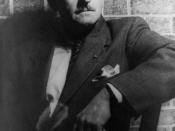William Faulkner, a strong man with even stronger words, fights hard to express his virtues and ideals in his many writings. The first section of his novel The Sound and the Fury is told by a mute handicap whose only means of communication is moaning and flailing his arms. However, the words he cannot speak are processed within his mind, as he lives through memory after memory, unable to differentiate between the past and the present.
Faulkner believed that individuals live as prisoners of the past, posing as slaves of society, no longer living by morality. Benjy, the handicap, lives as such. His section of the book is told by jumping between memories, never truly absorbing what was happening, but only what he saw, heard, and occasionally felt. Benjy is thus reliving his past through his memories, and his limited intelligence entraps him from escaping his repetitive life. The transition from one memory to another is shown via the usage of italics.
For example, when Benjy says, "She put her hands out but I pulled at her dress. Her eyes ran," he speaks of when Caddy lost her virginity -- but then the very next sentence jumps to his name change, "Versh said, You name is Benjamin now" (Faulkner 69). And these shifts do not necessarily begin a new paragraph. "I hushed and got in the water and Roskus came and said to come to supper and Caddy said," is a prime example of such awkward transitions (Faulkner 17). He ends the paragraph here, and begins a new one with what Caddy was saying.
Another belief of Faulkner is also that primitive man has no standards that he must live up to; he instead lives for himself. The social man, however, has more restrictions that he must follow; he...


